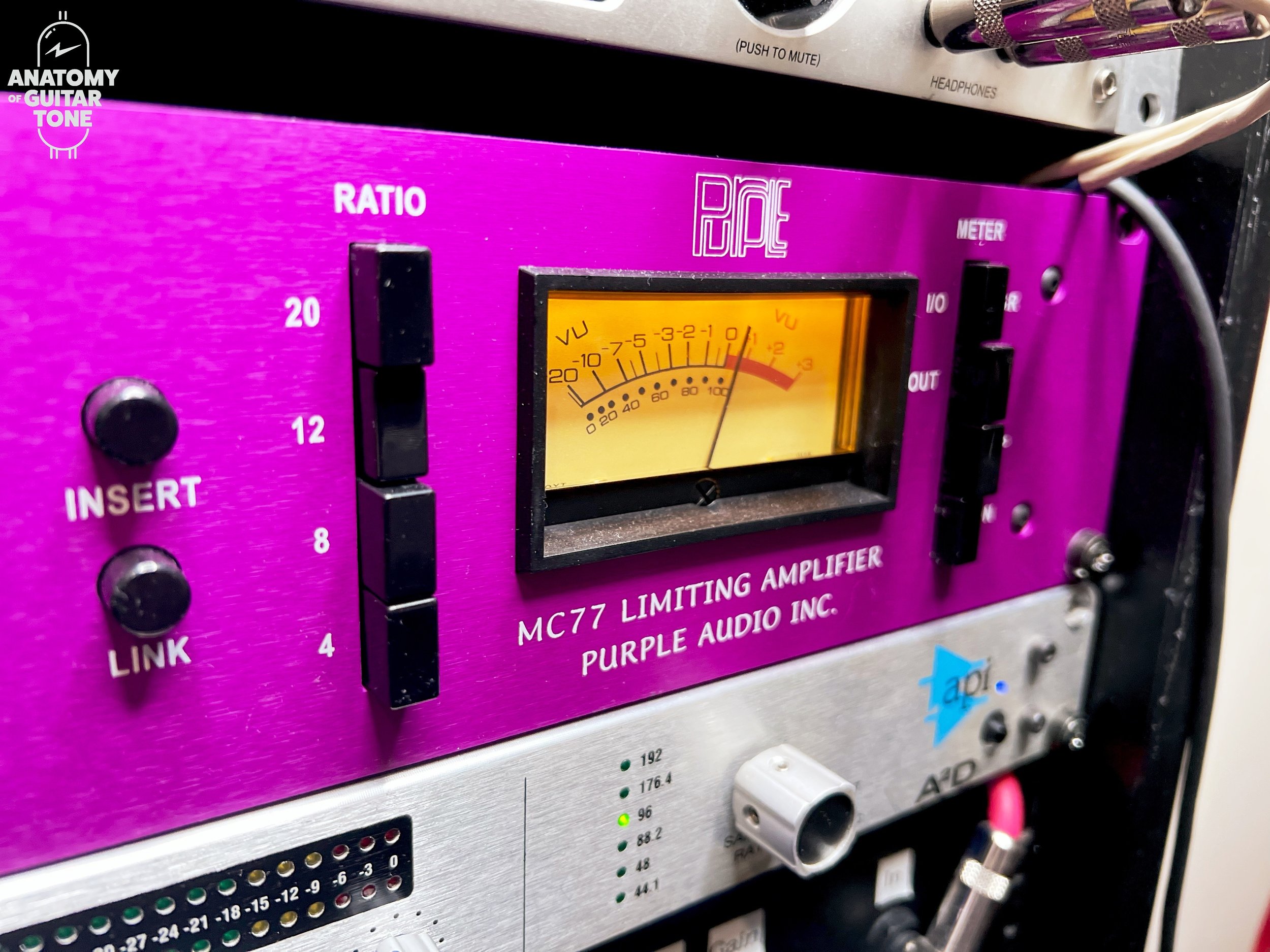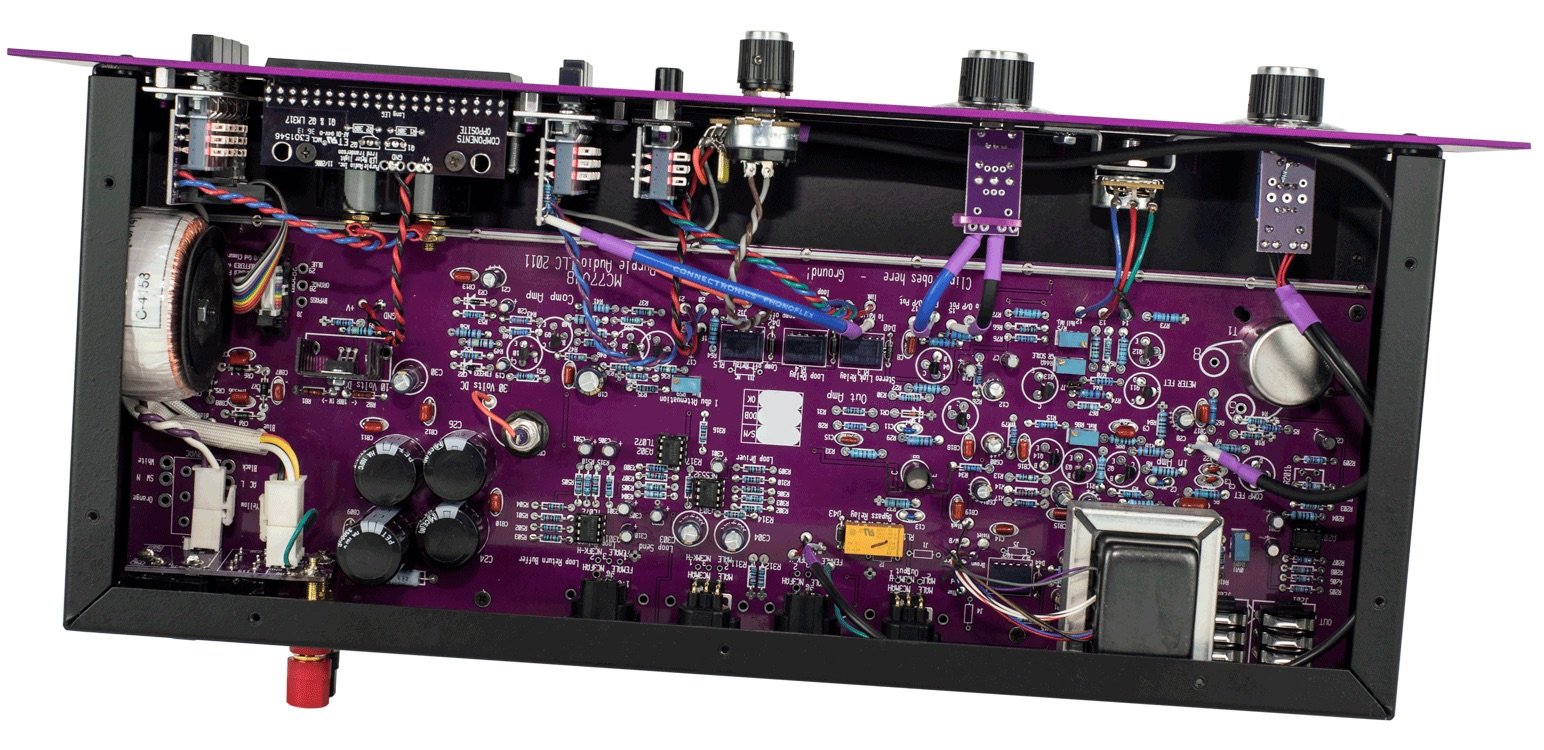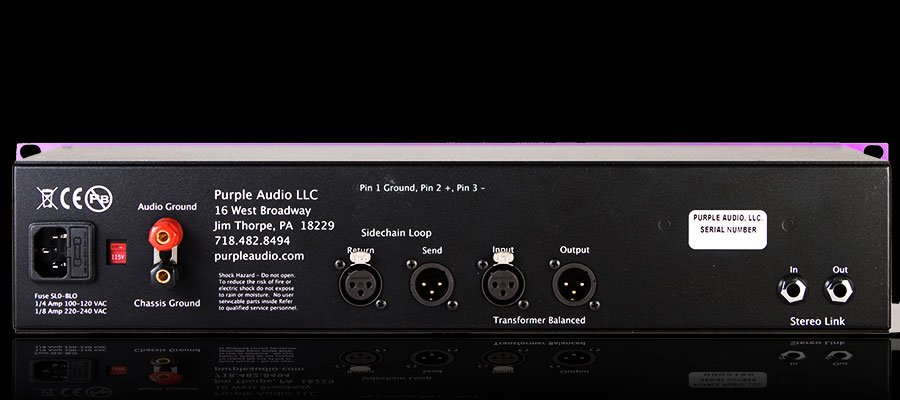Purple Audio MC77 Compressor for Guitar and Studio
We live in a world of audio interfaces and analog gear-emulating plugins. So it’s not uncommon to see musicians and composers plugging straight into a Universal Audio Apollo.
I think the Apollo sounds excellent. It's incredible how close it comes to some analog gear—and it has made high-quality recording available at an affordable price. But if you stop there you won’t understand why analog gear is still important.
Some analog devices are still a must in my digital workflow. For example, I still prefer outboard delays. It's hard to put my finger on it, but I don't love most delay plugins. Most fall short in my opinion. My favorite in-the-box delay plugins for mixing are the Valhalla Delay and Echorec. They're fantastic. But I often want to record with delay or adjust the delay parameters in real time.
The same goes for reverb. I use a Demeter Reverbulator, a Chase Bliss CXM 1978, and some old Lexicon LXP-1 reverbs for live manipulation and their specific flavors. I tend to like more reverb plugins than delay plugins. So I use Valhalla Room, Valhalla Vintage Verb, UAD EMT 140, UAD Capitol Chambers, and UAD Lexicon 224.
You could say I have a hybrid setup. A lot of analog gear finds its way into my setup out of problem-solving. I ask myself questions like: how do I get the delay sound I want? What am I not getting from plugins?
Compression
I've used a lot of analog compressors over the years. But since the pandemic, I haven't been to many studios. So I've mainly been using my Apollo and compression plugins such as the UA 1176 collection in my studio.
I’ve encountered a few issues with ITB compression. For instance, acoustic guitar didn’t sound as thick as I’d like. I couldn’t put my finger on it. Although I have an Apollo, my main preamps are real API 312s. While the UA preamps and preamp emulations sound good, there is still a difference using analog APIs. I hear more dimension in the sound.
When recording acoustic guitar with my analog API 312, I’ve also used a UA 1176 plugin in the unison slot, which allows me to print the sound. Something still wasn't right, though. The sound was still anemic.
My troubleshooting mind immediately went to the analog compressors I've used in studios. So I tried putting a compressor before the converters for guitars, vocals, synths, bass, etc., which led to me to Purple Audio MC77—and a revelation.
People who’ve used a lot of genuine compressors know that although the 1176 revision E compressor has been modeled in plugin form, it doesn’t act the same as the real version. I'm not saying plugins sound bad. But if you expect to use the same settings, you’ll find they don't perfectly translate.
“You simply can’t push a plugin compressor the same way you can an analog compressor.”
You simply can't push a plugin compressor the same way you can an analog compressor. You won't "hear" the compression as clearly with a plugin as you will with an analog compressor. This is why a lot of mixers in the plugin world use compression in series, meaning two compression plugins following each other, with lighter settings.
Analog compressors just give more. They allow for a broader range of useable compression. And they add other goodies as well.
Tone
I noticed another important detail when using the Purple Audio MC77 with my API 312 mic preamps. There was more depth to the tone of the signals I was recording. That anemic sound I mentioned with the acoustic guitar was gone.
This shouldn't have been a revelation, given the analog gear I have used. But it’d been a while, and I’d been recording exclusively in my small Brooklyn studio since the pandemic.
During that time, I had moments of engineering frustration with vocals, acoustic guitar, electric guitar, Mellotron, bass, dynamic ambient sounds, piano... Ok, with EVERYTHING I was recording.
I found myself wanting a thicker sound, a more forgiving compressor, or some gentle compression before the converters. All signs pointed to an analog compressor.
Straight In
You’ve heard it said that you must record your signal as cleanly as possible into your DAW to give yourself maximum flexibility later. That’s a legit approach that may work for some, but it's not one I subscribe to.
“I prefer to record sounds as close as possible to my desired tone. ”
I'm old school with engineering. I prefer to record sounds as close as possible to my desired tone. I'm more interested in nailing a sound than in giving myself flexibility later. I make decisions as I go because I feel it helps shape the composition. I don't want to imagine what it will sound like later.
I'm not afraid of printing compression. A lot of the time I'm just kissing the signal. But sometimes I use compression more as an effect.
Fuzz Me Out
I’ve been asked if I use compression with fuzz guitar or heavily distorted guitars, as these sounds are already naturally compressed. The answer is yes. I use a compressor—but not for compression. Guitars sound great through an 1176-style compressor, but not because it adds more squeeze.
On an old 1176, I’d have to watch my gain staging to keep the needle steady. So I’m essentially running through a compressor but I’m not compressing.
“The Purple Audio MC77 lets you turn the compression off and simply run the signal through the preamp circuitry.”
Here, Purple Audio owner and designer Andrew Roberts stayed true to the original 1176 Rev E circuit: the Purple Audio MC77 lets you turn the compression off and simply run the signal through the preamp circuitry. This is brilliant! I can get the extra weight I want for fuzz and heavy guitars without over-compression.
I'm not just using a compressor for dynamics control but for tone coloration and enhancement. Placing this enhancement before the converters also makes a difference to my ears. I have noticed a substantial difference using the MC77 in tracking pre-converters versus using an 1176-style compressor in a unison slot or as a DAW plugin.
I'm not saying you can't make great music with plugins. I'm also not saying buying an MC77 will make your music great. But with good musicians, a strong composition, and good-sounding instruments, it makes a noticeable difference.
As far as technology has come—and it has come far—I still believe in having an excellent preamp, EQ, and compressor before the converters.
Power Me Up
As mentioned, the Purple Audio MC77 is an 1176 Rev E circuit. But as a former repair tech in New York City, Andrew saw first-hand some flaws in the original 1176 design that, if fixed, could improve its reliability and reduce noise.
On the original Urei 1176 the output transformer is in the middle of the circuit board, which often damages the board in transit. Andrew moved the transformer to the back wall to prevent the circuit board from cracking.
Link
You may want to link two compressors together to record a stereo source—for example, a stereo acoustic guitar, piano, and drum overheads. The Purple Audio MC77 lets you "link" the controls of two MC77s.
Insert
The Purple Audio MC77 also has an insert button that lets you sidechain the MC77 to an input source. This is helpful for ducking effects and for de-essing.
Noise Floor
Andrew also made the 1176 Rev E circuit quieter—a welcome feature. I'm pretty amazed at how quiet the MC77 is.
Andrew changed the open frame power transformer to a toroid, which produces less noise. He also added high-frequency bypass capacitors around the rectifier. And by upgrading the caps and the ground plane on the PCB board, he further reduced noise.
Finally, Andrew also added meter buffering to remove rectifier distortion when the meter is selected to monitor in/out.
Price
Yes, 1176 circuits can be pricey. The Purple Audio MC77 is in the middle of the price range but on top for quality and sound.
Universal Audio still makes an 1176, and it sounds good. But it sells for $2,599 at Sweetwater. The Purple Audio MC77 sells there for $1,850. Why is the Universal Audio $750 is more expensive than the MC77?
It’s not a superior product. You're paying more for the name of a legacy product. Universal Audio decided it was worth making at that price.
Note that Universal Audio’s version doesn't include the updated power supply, sidechain, or insert ability.
It costs more but offers less than the Purple Audio MC77. Not that the UA 1176 sounds terrible. But it's not better than the Purple Audio MC77.
How Low Can You Go
What about the even cheaper 1176 circuits surfacing these days? I’ll mention first that I'm surprised the Purple Audio MC77 is only $1,850. I visited the Purple Audio shop and saw first-hand the quality of components used in the MC77.
The MC77 could sell for more. Andrew told me that when he started making the MC77 there was just a $200 difference between the MC77 and the UA 1176 reissue. Over the years, UA has kept raising the price, while Andrew has barely raised his.
Blue Light Special
The MC77 is a top-of-the-line compressor at a reasonable price. Now let's discuss some of the new, cheap 1176-style compressors flooding the market.
Spoiler alert: They're not the same! To make an 1176 cheaper and more affordable, compromises must be made—in tone, reliability, and features.
“Yes, buying a 1776-style compressor on the cheap can be appealing. But there’s a point where the compromises aren’t worth the discount.”
Yes, buying a 1776-style compressor on the cheap can be appealing. But there’s a point where the compromises aren't worth the discount. I'm not going to name companies and throw shade. I'm just going to say if you see an 1176-style compressor priced below the MC77, be wary. I would spend the money on the MC77 as a lifetime investment. I know I'll never part with mine, and it's made to last.
Aside from quality control issues, these cheaper 1176 circuits don't sound the same. Some may be ok with lesser sound quality for a hint of 1176, but for cork sniffers like me, these cheaper versions just don’t cut it. They just don't sound the same to my ears. My advice would be to buy less gear but better gear. Buy things you will own for a long time.
Mellotron
I've been using the MC77 on the Mellotron M4000D. The Mellotron has tons of character. So I don't feel the need to add more character or weight. But because the Mellotron’s samples were recorded many decades ago, they can be out of balance. Sometimes a “sample” or tape loop pops out a bit.
I use the MC77 for tracking to keep the sounds balanced. I'm not heavily compressing. I do this before the converters. The parts will be balanced on playback by tracking with dynamics control on the Mellotron M4000D.
Synth
I use three analog synths and one digital synth. I rarely use plugin synths. My synths love the MC77.
The Moog Mother 32 can have surprising dynamics—more extreme than the Mellotron M4000D. The MC77 protects from clipping the converters on the way in, as I like to tweak many knobs in real time on the Mother 32.
“The MC77 adds a level of security for self-engineering and -performing. If a sound pops out, it won’t clip the converters and ruin the take.”
This raises an important point. When I use analog synths such as the Sequential Circuits Prophet 10 or Dave Smith OB-6, I like to tweak them during performances. For example, I may reach for a filter or the parameters. And it can cause a volume spike.
Sometimes I'm surprised by the volume jump when using polyphonic aftertouch on my ASM Hydrasynth. I'm not using the MC77 to make up for poor gain staging. Instead, I check and watch my levels as much as possible while I’m performing. The MC77 adds a level of security for self-engineering and -performing. If a sound pops out, it won't clip the converters and ruin the take.
Sound
In addition to providing dynamics control, using the MC77 with the Prophet 10 or OB-6 sweetens the sound. These two synths sound so good already that it’s hard to imagine how much better they could sound. But the MC77 adds another level of full sound realization. These synths sound more like a record when the MC77 is tied in. Analog synths can sound huge with the MC77!
Acoustic Instruments
I’ve mentioned that acoustic guitars can sound anemic. That’s why I always have the MC77 tied in for some kind of compression while tracking acoustic guitar, mandolin, banjo, resonator, ukulele, and piano.
Electric Guitar
Electric guitars and an 1176 circuit are like chocolate and caramel. They pair perfectly. Depending on the guitar tone I'm recording, I'm either using light compression or just running the electric guitar through the circuit. Either way, the MC77 elevates the tone.
I'm not necessarily trying to control the dynamics of the electric guitar here, just enhancing the tone. When we used to record to tape, the tape added a gentle amount of compression. Unfortunately, the digital realm lacks this natural compression.
Sometimes I also use the MC77 for a very subtle "tape" compression, such as with electric guitar. Again, it acts as sonic glue.
Other times, the MC77 adds weight to the guitar's tone, and I don't even need the subtle compression—just the circuit. These situations are variable, so I use my judgment in the moment, based on what I’m trying to get. This raises the very good point that you should have a vision (or a sound in your head) of what you want each tone to sound like. Having an idea and making decisions early can help your production. Don't just blindly record. Think about your goal.
I've been fortunate to hear the multi-tracks from many classic albums. One thing that sticks out among them is how good they sound with faders up. Meaning much of the meat and bones of the tones were recorded that way.
I’ve adopted this method. And the MC77 is an essential tool in my process.
Turning the attack knob fully counter-clockwise removes the compressor from the circuit.
Bass
Bass loves compression. Bass is an instrument I fight with if I'm adding compression with plugins. It takes a lot to get it there, and I find myself using several in series. Whereas if I track with the MC77, I need much less at mixing. When I tie in the MC77 after my API 312s, it's the instant gratification of sounding right. This means I can mix faster. And it means I feel more settled when I hear the playback.
Virtual Instruments
To elevate the tone of virtual instruments, I like to run them through the Purple Audio MC77 and API preamps. It makes them sound more rounded out and less digital. Virtual instruments such as those offered by Arturia sound pretty good. But there still seems to be something missing that the analog signal chain fixes.
Sound Design
When using synths such as the Moog Mother-32 and the Chase Bliss CXM 1978 for sound design, I like to use the MC77 to limit the dynamics and avoid any surprise clipping.
Vocals
I'm not using the MC77 in a revolutionary way when tracking vocals. It’s simply for some dynamics control on the way in. At least that's what I thought until I heard the MC77. It adds a depth to the vocals that I could not get by adding EQ later. The vocal chain I use to record Abby Ahmad sounds better with the MC77 tied in.
I made two records with Abby over the last two years where I used only a Soyuz Bomblet into the API 312s into the Apollo. I wish I’d had the MC77 all along. It would have made my job a lot easier, and I feel like I would have processed the vocals less, resulting in less work.
Modern Home Studio
Today you can make an excellent-sounding record in your home. But educating yourself on gear can take years and lots of money.
There are many opinions about this, but I'll make a suggestion—and remember that I'm looking not for the cheapest method but for the highest ratio of bang for your buck to top-notch sound.
You can't afford everything, so don't try. Focus on the essentials.
What are those essentials? Unless you're a drummer or you’re setting up a commercial studio, record drums in a pro studio. I know—that’s a major buzzkill.
Build two world-class signal chains and limit yourself to that. It's better to have two incredible channels that can stand up to any studio versus many mediocre channels.
I mainly use two input channels (yes, this will depend on your situation). I have more channels through the Apollo if I need them for a live performance. But for serious recording I focus on two channels with four elements:
Mic: It's essential to have one or two great mics! Not just decent but great. Yes, it’s not cheap. These should be mics you'll grow old with.
Mic preamps: It's also essential to have two fantastic mic preamps. I love my API 312s. Maybe you're into Neve. Find your flavor. But having two high-end preamps is important, even in this age of plugin emulation.
EQ: I like EQ for tweaking before the converters. It saves me time and allows me to filter or EQ the sound going into the compressor. I'll use less EQ in the mixing process because it will sound closer to mixed while tracking.
Compressor: I recommend the Purple Audio MC77. It's a highly flexible compressor that excels in most situations.
Converters: I really like the UA Apollo systems. They sound great and offer many solid options for plugins when it comes to mixing. The zero-latency monitoring and access to their LUNA DAW make the deal even sweeter. But don't cut corners on your audio interface. There are a lot of street hustler interfaces luring you into sketchy business deals. Don't be fooled. Don't buy anything less than the Apollo.
Yes, I know how expensive this is. It's why I’m steering you away from recording drums. It is possible to fund one or two channels of high-end gear for a recording chain. Drums require a whole other level of investment that gets really deep and isn't worth it unless you're opening a commercial studio or have a lot of money. (I'm a drummer and I’m saying this.)
Yeah, But...
Everything can be done inside the box, but that doesn't mean you should. Not that it sounds bad. I've done and continue to do a lot in the box. But nowadays I do more than I used to in the analog realm.
If you still feel something is missing in your sound after you’ve used good instruments and gotten good performances, I encourage you to look at your tracking signal chain.
The Purple Audio MC77 has been a significant upgrade to my recording chain. I highly recommend that you look into how it could elevate your recordings.




















